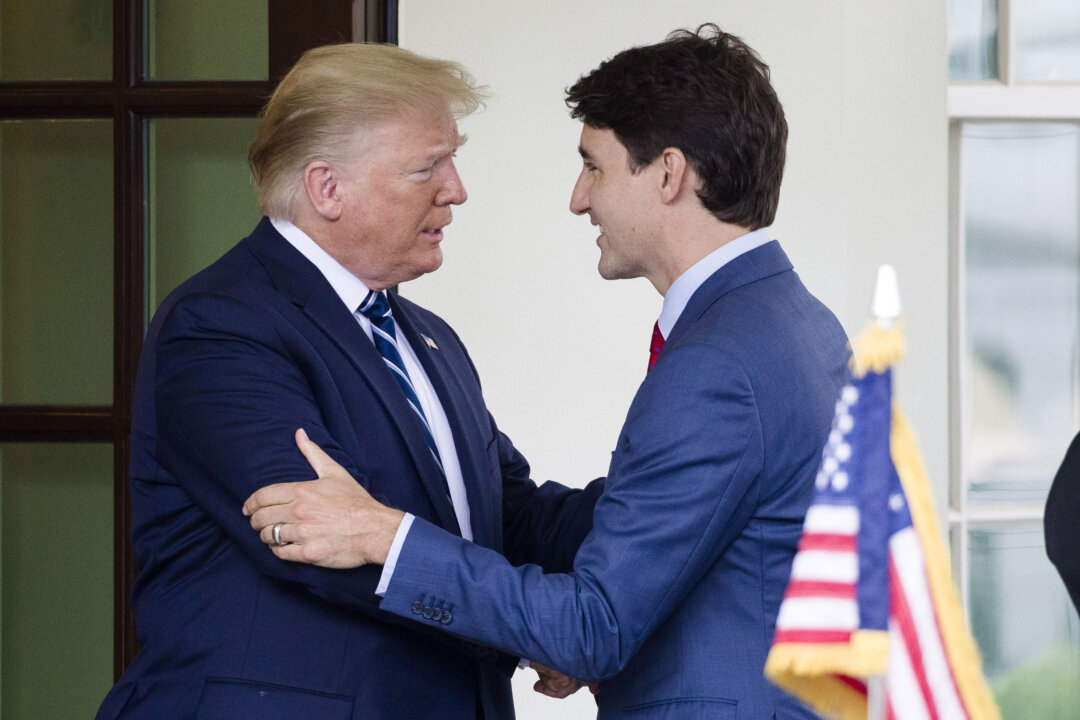The call between the two took place after Trump issued a statement saying he would impose a 25 percent tariff on all goods coming from Canada and Mexico.
Prime Minister Justin Trudeau says he had a good conversation with U.S. President-elect Donald Trump shortly after Trump threatened to slap high tariffs on Canadian goods over border security concerns.
“It was a good call,” Trudeau told reporters on Nov. 26 on his way to the weekly cabinet meeting on Parliament Hill.
The prime minister said the two talked about “laying out the facts” and about “how the intense and effective connections between our two countries flow back and forth.”
The call between the two took place after Trump issued a statement saying he would impose a 25 percent tariff on all goods coming from Canada and Mexico on day one of his administration on Jan. 20, 2025.
“This Tariff will remain in effect until such time as Drugs, in particular Fentanyl, and all Illegal Aliens stop this Invasion of our Country!” he wrote on social media. Trump added that Canada and Mexico have the power to solve this problem and until they do, “it is time for them to pay a very big price!”
Trump pledged during his presidential campaign he would impose broad tariffs of between 10 and 20 percent on all goods imported to the United States. While Trump said Mexico could be slapped with higher tariffs, he had not previously discussed his plans for Canada.
The Liberal government has been preparing for the new U.S. administration for nearly year, anticipating a Trump return could mean the introduction of new trade measures. Canada retaliated after the first Trump administration imposed tariffs on Canadian steel and aluminum in 2018.
Ottawa’s approach has been to send delegations across the U.S. to meet with different levels of government and industry leaders to build relationships and communicate about the importance of the trade relationship.
“This is a relationship that we know takes a certain amount of working on, and that’s what we’ll do,” Trudeau told reporters, saying using a “Team Canada” approach is “what works.”
Ontario Premier Doug Ford also called for a unified approach as he reacted to Trump’s statement on Nov. 25. Ford said on social media the tariffs would be “devastating” for workers in Canada and the U.S. and he asked Trudeau to call an urgent meeting will all premiers.
Trudeau said he reached out to Ford immediately and agreed a first ministers’ meeting will be held this week to discuss the developments.During the electoral campaign, Howard Lutnick, Trump’s pick to head commerce and trade, had framed using tariffs as a trade negotiating tactic.
Industry Minister François-Philippe Champagne was asked by reporters on Nov. 26 whether the tariff threat could be seen as a bargaining tool.
“We have to take that seriously, there’s no doubt,” he said before a cabinet meeting. Champagne said there are still a number of weeks to engage before Trump goes back to the White House. He said his government will emphasize the importance of the strategic relationship on security and supply chain resiliency.
We need to make “sure that they understand that this would have an impact on the U.S. economy,” Champagne added.
Regarding Trump’s criticism of Canada on the border, Immigration Minister Marc Miller said the flow of people going both ways has been a concern in recent years.
“So we have shared interests in making it something that is manageable and controlled,” Miller said before the cabinet meeting.
Miller remarked that the flow of migrants crossing at the Mexican border dwarves that of the Canada border.
“It’s not something that, at the same time, I want to not take seriously, because it is; it is serious,” he said. “And we have a job not to make our problems the Americans’ problems, and they have a job not to make their problems ours.”
Tom Homan, Trump’s pick to oversee the borders and facilitate his promised “mass deportation” of illegal immigrants, said recently he views the border with Canada as an “extreme national security vulnerability.”
Homan said there are fewer agents securing the Canadian border given the priority of the Mexican border and he is concerned about individuals with terrorism links who cross into the United States.
Meanwhile, Canadian authorities have been preparing for a potential increase in illegal immigrants coming from the U.S. to avoid being deported. The RCMP said it has worked on contingencies for different scenarios, ranging from a small uptick in crossings to a “complete crisis.”

